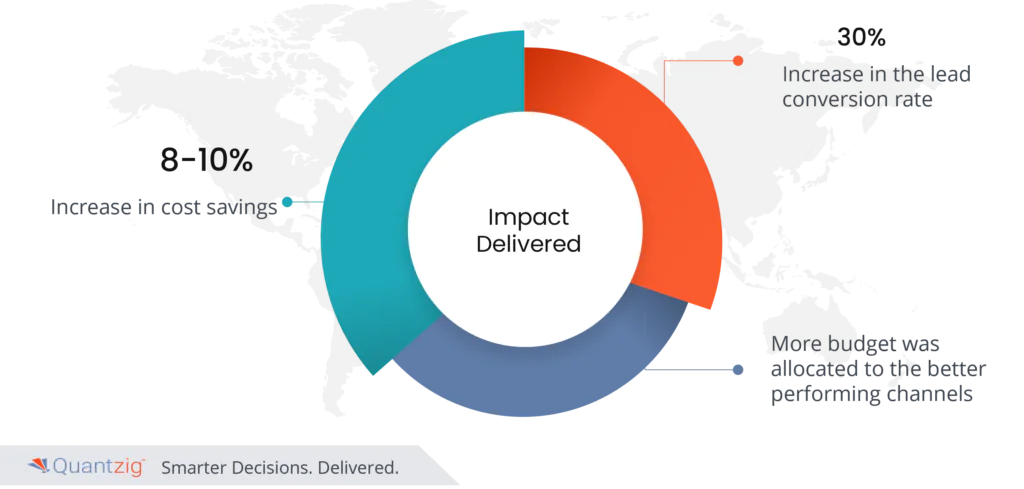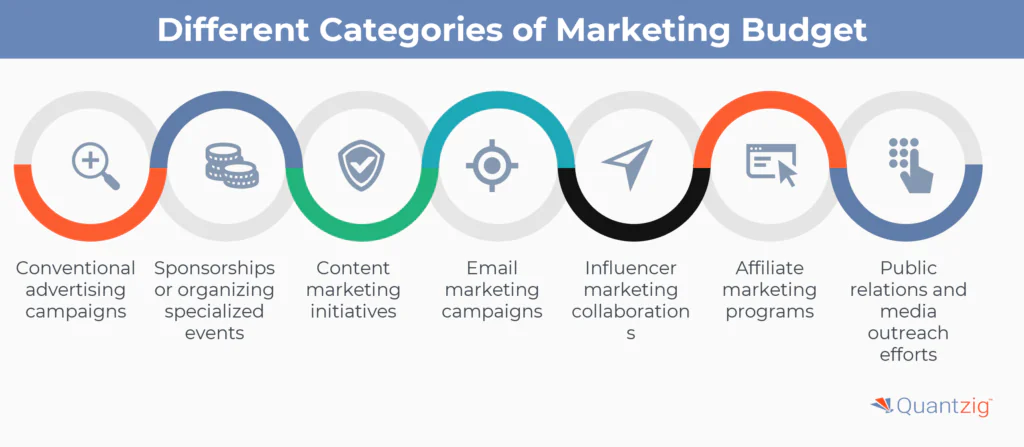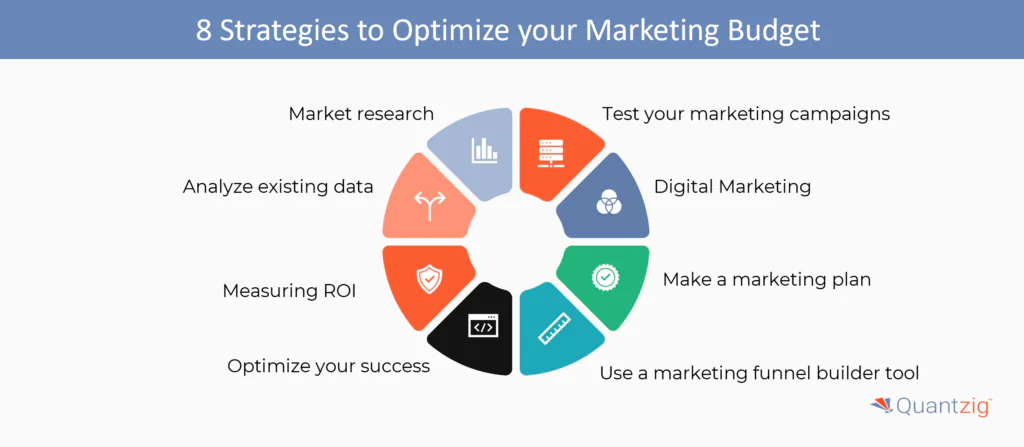Author: Associate Vice President, Analytics and Data Strategy, Quantzig.
Table of Contents
Introduction
We all know marketing has a significant impact on any company’s website traffic, revenue growth, and brand recognition. For marketers operating with limited funds, optimizing marketing spend is essential to improve business performance without overspending your marketing dollars. But do you know how to properly optimize marketing budgets to recognize your company’s specific requirements as well as tap into your company’s core strengths? This case study highlights how Quantzig’s Marketing Budget Optimizer tool helped a US-based retail company achieve an 8-10% increase in cost savings and a 30% increase in the lead conversion rate.
Book a demo to experience the meaningful insights we derive from data through our analytical tools and platform capabilities. Schedule a demo today!
Request a Free DemoQuantzig’s Marketing Budget Optimization Solutions for an E-commerce Brand
| Client Details | A leading US-based e-commerce retailer with a diverse product portfolio. |
| Challenges Faced by The Client | One of the key challenges our client was facing was to understand how to build a marketing spend efficiency that can provide trustable outcomes consistently. |
| Solutions Offered by Quantzig | We developed a Marketing Budget Optimization Simulator tool leveraging historical data, utilizing a hybrid Market Mix Model approach, and exhaustive exploratory data analysis (EDA) to understand main factors and provide simulation scenarios for What-If cases. |
| Impact Delivered | An 8-10% increase in cost savings and a 30% increase in the lead conversion rate. |
Client Details
A leading US-based e-commerce retailer with a diverse product portfolio.
Challenges in Marketing Budget Optimization Faced by the Client
The client was facing the key challenge of figuring out how to create effective marketing budget strategies with an optimization tool that could reliably generate trustworthy results. When they began developing the optimizer, it was difficult to consider budget distribution across multiple channels while also considering factors such as ROI, audience segmentation, seasonality, channel effectiveness, and more. This was to guarantee that the optimizer performs well across these parameters and produces accurate outcomes.
Marketing Optimization Solution Offered by Quantzig for the Client:
We developed a Simulator to enhance the marketing ROI optimization utilizing historical data on the performances of previous campaigns at the channel and geographic levels. The Market Mix Model was built using a hybrid technique where multiple marketing budget optimization models were run concurrently, with the best-performing marketing budget optimization model designated as the champion and the others acting as challengers. The most precise model was always chosen by employing the challenger-champion concept. We also did comprehensive exploratory data analysis to identify key factors impacting their marketing budgets, like underperforming channels and messaging. The model examined all these factors and their interactions to generate simulation scenarios that could address hypothetical situations.
Impact Delivered using Quantzig’s Expertise:

The Marketing Budget Optimizer was useful in identifying ineffective marketing channels, resulting in cost savings of 8-10%. More budget was allocated to the better performing channels, which helped increase lead conversion by 30% compared to the previous 6 months’ average.
Also Read: Maximizing Marketing Budgets with Campaign ROI Analysis
Get started with your complimentary trial today and delve into our platform without any obligations. Explore our wide range of customized, consumption driven analytical solutions services built across the analytical maturity levels.
Start your Free Trial TodayBut, What exactly is Marketing Budget Optimization?
Marketing Budget Optimization is a systematic process of evaluating how any organization can best use its marketing budget management to target potential customers, maximize marketing campaigns’ effectiveness, and optimize budget allocation. The entire process of marketing budget planning integrates data analysis with marketing research, aiming to select the most efficient and effective channels to get the maximum ROI possible.
What are the Different Categories of Marketing Budget?
There are many types of marketing budgets, and each one has a unique goal that is crafted to promote your business or the offerings your business provides to certain target groups. Ranging from conventional advertising efforts like print media campaigns and other media purchases (television, radio, billboards, and so on) to promotional products, and even marketing tactics like sponsoring or organizing specialized events – the options are limited only by your marketing staff’s creativity and innovation.
With Quantzig as your partner, you can optimize your marketing budget across channels, ensuring efficient use of resources. If current marketing efforts aren’t delivering ROI, you’ll need to either improve those channels or explore new ones.
For instance, if your business is running successful campaigns and seeks further growth, consider building on similar strategies. If SEO content is driving traffic and boosting organic search hits, expanding with targeted social media campaigns can help you reach a broader audience, especially if your target customers prefer specific platforms.
Optimizing Your Marketing Budget: 5 Best Practices
To optimize your marketing budget effectively, it’s essential to use marketing budget allocation techniques that ensure maximum impact. By focusing on strategies that maximize marketing ROI and leveraging the right tools for budgeting marketing campaigns, businesses can enhance their marketing expense tracking. Implementing marketing budget analysis tools and following best practices for marketing budgeting will improve efficiency while reducing marketing costs. Making data-driven marketing budget decisions is key to ensuring every dollar is well-spent and drives value.
Use these five recommended practices to help you achieve this:
- To determine target demographics, evaluate competitors, and identify emerging trends, conduct in-depth market research. By ensuring that your marketing strategy is in line with consumer demands, this data-driven approach maximizes return on investment.
- Adopt an agile marketing approach to enable you to quickly modify your strategies in response to evolving funnel metrics and market conditions. This iterative process improves responsiveness to customer demands and efficiency.
- Leverage artificial intelligence and marketing analytics to extract meaningful insights from large datasets. Make use of AI-powered tools to predict trends, personalize content, and optimize social media marketing campaigns—all of which can improve customer marketing strategies.
- Set aside funds for the channels that have the best chance of yielding a return on your investment. Then, use marketing analytics insights to guide your spending decisions. Your marketing spend will have the greatest possible impact for this data-driven decision-making.
- Analyze and monitor campaign performance constantly, making strategy adjustments in response to immediate feedback. Measure key performance indicators and improve strategies for continuous marketing spend optimization by utilizing marketing analytics.
Your marketing initiatives will become more strategic, effective, and efficient by implementing these best practices, which will promote long-term company growth.
8 Strategies that Quantzig uses to Optimize your Marketing Budget
B2B organizations can get tremendous advantages from their marketing initiatives as well. While B2B companies may not have brand appeal to many consumers, they still have essential roles in their markets and provide other enterprises with the products, services, and solutions they need to function. For this reason, most of the b2b organizations want to optimize their marketing budget to engage with their potential clients effectively.
1. Market research
Market research is essential for marketing leaders to make informed decisions and optimize future budgets. Gaining insights into your target audience helps allocate resources more effectively. Techniques like surveys, focus groups, and customer personas provide valuable information to guide strategic decisions. Investing time in understanding your customers and market dynamics ensures the most efficient use of your marketing budget.
2. Test your marketing campaigns
For products that are very similar to competitors’ offerings, some of your marketing attempts may not work well. In this situation, it’s wise to try out your campaign ahead of time. Evaluate what is and isn’t successful for your product. The findings will assist you in adjusting your promotions and other aspects of your company’s marketing strategy.
3. Analyze existing data
A key step often overlooked in budget optimization is reviewing current data. Analyzing your marketing statistics can provide valuable insights into customer behavior, such as where they spend time, how they engage with your brand, and what they purchase. Sharing these findings with your team ensures transparency and empowers them to make smarter, independent decisions.
4. Digital Marketing
Digital marketing is now essential for any long-term strategy. Platforms like Facebook, Twitter, Instagram, and LinkedIn provide endless opportunities to connect with potential customers and build loyalty. Whether pursuing organic growth or a paid approach, ensure you have the right resources—such as outsourced vendors, Social Media Managers, and Paid Search Specialists—to manage each channel effectively.
5. Measuring ROI
Every marketing campaign needs a good analysis of the marketing spend and an objective benchmark to evaluate it. As all marketers want the highest ROI (Return on Investment), measuring the various aspects of your campaign is vital. If you assess the marketing ROI, you’ll be able to adapt your strategy based on what is effective and what is not.
6. Make a marketing plan
A well-developed marketing plan can assist you in structuring your campaign and coordinating marketing activities. When developing a plan, you need to think about all the different marketing channels, your marketing budget, and the strategies at your disposal. At the end of each quarter, your team should evaluate your marketing outcomes and reassess your marketing approach for the next quarter. This allows your team to remain flexible and, with an adaptable marketing methodology, prepared for the unforeseen.
7. Optimize your success
Marketing aims to turn website visitors into buyers. To accomplish this, you need to understand what tactics are effective and ineffective for your specific market. Pinpoint the traffic sources that are generating sales and those that are not producing any conversions. Then modify your marketing efforts to make them more successful. Adopt a data-informed approach to marketing and optimize your ad marketing spending for the return on investment your business merits.
8. Use a marketing funnel builder tool
To effectively budget your marketing spend, using a marketing funnel builder tool helps calculate key performance indicators (KPIs) for demand generation. With these metrics, you can determine the necessary budget to meet your targets. Planful offers a free funnel builder that optimizes your budget by aligning demand generation activities with your goals.
These eight methods for improving your marketing budgets are significant factors in producing a great return on your marketing investment. By implementing these recommendations, you can more effectively prevent misusing your budget on directionless marketing attempts, and you can utilize your time more efficiently.
Also Read: Track Business Progress with Marketing Analytics Dashboard
Experience the advantages firsthand by testing a customized complimentary pilot designed to address your specific requirements. Pilot studies are non-committal in nature.
Request a Free PilotHow Quantzig does Marketing Budget Optimization?
After your company’s marketing department has executed its advertising campaigns, it’s essential to analyze the data to determine which efforts were most effective. This process, known as marketing spend analytics or optimization, helps evaluate the ROI of each campaign by assessing total expenditures. Quantzig offers solutions like Proof Analytics, which provide dashboard views and marketing resource management tools to monitor key metrics. Without these tools, your organization risks missing out on potential revenue by not making informed decisions about optimized marketing spending.
Quantzig’s marketing analytics tools help your team understand which strategies have been successful and highlight areas for improvement. Many businesses operate with limited marketing budgets, and marketing analytics offer valuable insights into the most effective tactics. By using centralized software and marketing spend optimization solutions, Quantzig equips your team with the flexibility to develop more successful strategies while reducing the time spent on data compilation, allowing for the exploration of new marketing methods.
Conclusion
Effective marketing budget allocation strategies are crucial for maximizing return on marketing investment. Using marketing spend analysis tools helps assess marketing campaign performance and identify improvement areas. By implementing marketing spend tracking and analyzing marketing efficiency metrics, organizations can develop ROI-driven marketing strategies that minimize waste. Leveraging data-driven marketing optimization and marketing spend management tools further enhances resource allocation, ensuring every dollar spent contributes to strategic objectives.






